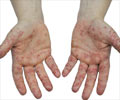In a study conducted by Researchers at Carnegie Mellon University, majority of sexually active adolescent girls have negligible knowledge about sexually transmitted diseases, until they are bitten.
In a study conducted by Researchers at Carnegie Mellon University, majority of sexually active adolescent girls have negligible knowledge about sexually transmitted diseases, until they are bitten.
Julie downs, lead author of the study and a member of the Department of Social and Decision Sciences at Carnegie Mellon is of the opinion that in most cases Kids know about Sexually Transmitted diseases only post diagnosis. A survey conducted amidst 300 adolescent girls in the Pittsburgh area, were tested with queries about eight prevalent and notorious STD’s. Shocking, as it may seem, this study proved an eye opener- sexually rocking Teens knew very little about the pitfalls of contracting sexually transmitted diseases. And those in the know of a particular disease was because they had contracted it! In summary, barring HIV Aids, that topped the Teen Knowledge Chart, they had no clue about other STDs.Downs believes that knowledge about HIV/Aids is definitely relevant, yet there should be sufficient focus on empowering teens with knowledge of other STD’s, to enable them take an informed step. The risks involved are most often irrevocable especially when sexually active ignorant teenage girls contract a deadly STD and delay the treatment. Genital Herpes for example is incurable, and Chlamydia can lead to infertility.
Every cloud has a silver lining. According to a 2004 study, (co-authored by Wandi Bruine de Bruin and Baruch Fischhoff of the Department of Social and Decision Sciences at Carnegie Mellon, and Pamela J. Murray, director of adolescent medicine at Children's Hospital of Pittsburgh), conducted amongst the same group of adolescent girls, it was found that those who had imbibed the essence of the interactive sex education DVD created by Carnegie Mellon researchers were aware and hence unlikely to indulge in sexual behavior fraught with risks.
The findings of the study are due to be published in the January edition of the Journal of Adolescent Health.











